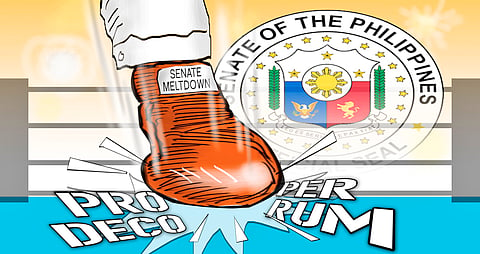
- NEWS
- the EDIT
- COMMENTARY
- BUSINESS
- LIFE
- SHOW
- ACTION
- GLOBAL GOALS
- SNAPS
- DYARYO TIRADA
- MORE

In a democratic society, lawmakers are entrusted with the task of drafting and passing laws, deliberating on policies, and ensuring that the governance serves the interest of the people.
This responsibility demands not only intellectual acumen and a sense of public service but also adherence to a high standard of decorum. Recent incidents in the Philippine Senate and the Manila City Council, however, have raised questions about whether some lawmakers are straying from the decorum expected of them.
The clash between Senators Alan Peter Cayetano and Migz Zubiri, alongside the near-fracas that erupted during Manila City Council deliberations on the city’s 2025 budget, serves as a timely reminder of the importance of decorum in legislative settings. While debate and disagreement are integral to democracy, the way such conflicts are handled can either elevate the discourse or degrade the institution’s reputation.
Decorum in legislative bodies refers to the respect, courtesy, and adherence to formal procedures that guide interactions between members. It is not merely about maintaining a sense of civility but about upholding the dignity of the institution.
Legislators, as public officials, represent their constituents. Their conduct in office mirrors the level of respect they hold for the public trust bestowed upon them. When lawmakers engage in heated arguments that verge on personal attacks or disruptive behavior, they not only jeopardize productive deliberation but also undermine public confidence in the institution they serve.
The altercation between Senators Cayetano and Zubiri is a case in point. Both senators, seasoned politicians, are no strangers to debate. However, their recent clash — marked by sharp exchanges and accusations — strayed into personal territory.
Such confrontations distract from the real issues at hand and risk transforming a respected institution into an arena for political theatrics. It’s one thing to debate policies with passion; it’s another to allow disagreements to spiral into unproductive discord.
In this case, both lawmakers seemed to have allowed personal grievances to overshadow the decorum that their positions demand.
To avoid such incidents, lawmakers must remember that they are not only representatives of their own political interests but also guardians of the country’s democratic institutions. Respect for parliamentary rules, refraining from personal attacks, and maintaining professionalism, even in the face of heated disagreement, should be non-negotiable. Debates should focus on the substance of policies, not on individual personalities or rivalries.
Similarly, the Manila City Council’s deliberations on the city’s 2025 budget teetered on the brink of chaos. Reports suggest that tensions among councilors became so heightened that it almost led to a physical confrontation.
Such behavior, especially in a public forum, erodes the public’s confidence in local governance. These tensions reflect a deeper problem — lawmakers who prioritize their personal or political agenda over the proper functioning of their legislative duties.
The ramifications of improper decorum in legislative bodies extend beyond the immediate participants. Such incidents fuel public cynicism toward politics and governance. In a time when trust in government is often fragile, displays of unprofessional behavior can deepen the public’s alienation from the political process. It perpetuates a perception that lawmakers are more concerned with their personal disputes than with serving the people.
Time and resources are wasted when debates devolve into personal attacks. Instead of focusing on solutions and the public good, lawmakers are sidetracked by internal squabbles. This diminishes the quality of governance and policy-making.
While it is natural for lawmakers to have differing opinions, it is crucial to remember that there is a right way to express disagreement. Parliamentary rules and procedures exist to ensure that debates remain respectful and productive.
Lawmakers must exercise restraint, demonstrate respect for their colleagues, and focus on the issues at hand, not on personal rivalries or political gamesmanship.
In all, proper decorum is not just a formality — it is the foundation of a functioning democracy. The recent tensions in both the Senate and the Manila City Council serve as a wake-up call for lawmakers to reflect on their conduct.
Public service is a privilege, and with it comes the responsibility to uphold the dignity of the institutions that serve the people.
